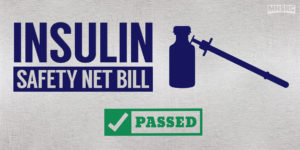The Minnesota Legislature today unanimously passed legislation that would provide insulin to those in need and implement measures to help people before they reach a crisis point.
The bill requires insulin manufacturers to provide a 30-day supply of insulin for free to individuals in urgent need but struggling to afford the life-saving drug. Additionally, patient assistance programs through drug companies, which have been questioned as too onerous and cumbersome with limited qualifications, must be made accessible and transparent with their application and approval process. The new law creates standard criteria for these assistance programs and stipulates an application must be approved or denied within ten days.
“This is great news for every diabetic who needs insulin,” said Sen. Roger Chamberlain (R-Lino Lakes). “Our efforts last year allowed the market to take care of much of the problem, and as a result, far more people can afford their insulin now than last year. That’s fantastic. Our plan helps everyone else who might have been left behind and has protections that will help them avoid ever reaching a desperate point.”
In 2019, Senate Republicans instituted reforms to address the cost and emergency needs of insulin and other life-saving drugs. Pharmacies are already required to provide a 30-day supply of insulin and other life-saving drugs if a prescription runs out. Legislation in 2019 also prevents health plans from charging patients more than the wholesale cost of insulin to prevent profiteering off the drug and requires Pharmacy Benefit Managers to regularly communicate discounts and rebates with the pharmacy for the patient to use first.
The Senate is leading the fight to reduce the costs of health care and prescription drugs with innovation. In 2017, Minnesotans had limited options, fewer providers, and double-digit cost increases in the health insurance market. The Minnesota reinsurance plan stabilized the costs, opened up more options, especially for rural communities, and has become a model program for other states. In 2020, the Senate began exploring reimportation programs that would allow Minnesotans access to lower-cost drugs available in other nations. The federal government for the first time ever announced an openness to approving reimportation plans in individual states last December.

